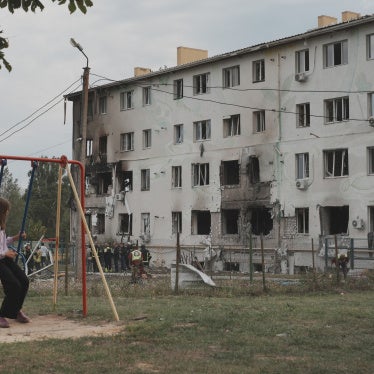A report by the UK's Foreign Affairs Select Committee overlooks crucial problems with the US government's detention of hundreds of detainees in Guantanamo Bay, Human Rights Watch said today.
"There is a need for international scrutiny of Guantanamo, but it should be rigorous and objective," said Tom Porteous, London director of Human Rights Watch. "This report glosses over US policies and practices that are unacceptable by international standards."
The report, issued on January 21, contends that although abuses of detainees took place in Guantanamo in the past, it is "highly unlikely" that they continue at the present time. Yet the committee members reached this conclusion without interviewing any detainees, let alone talking to them confidentially.
"The Foreign Affairs Committee's methodology was deeply flawed," said Joanne Mariner, terrorism and counterterrorism program director at Human Rights Watch. "By speaking to the interrogators but not to the detainees, the committee lacks a fair basis for its findings."
A full and accurate picture of conditions cannot be obtained simply by reading documents and speaking to government officials, said Human Rights Watch, an organization that has documented prison conditions in countries all over the world for more than 25 years. Without an opportunity to also talk with detainees, any report will inevitably be one-sided - a concern that is shared by the United Nations. When a team of UN investigators were offered a visit to Guantanamo in 2005, they insisted that detainee interviews were a "non-negotiable pre-condition" for conducting such a visit. When the United States informed the UN investigators that they would not be permitted to speak to individual detainees, the delegation declined the invitation.
Another worrying aspect of the Foreign Affairs Committee's report is its implicit endorsement of the US government's claim that detainees perceived to be dangerous can be detained indefinitely without charge. In its discussion of the future of Guantanamo, the report accepts that many of those held at Guantanamo "represent a threat to the United Kingdom and its allies" and suggests that their continued detention without charge would be acceptable if carried out collectively by the international community.
"It's wrong to suggest, even implicitly, that indefinite detention without charge is an acceptable solution," said Mariner. "If these men are as dangerous as the US government and the UK Foreign Affairs Committee say they are, they should be prosecuted and given fair trials, not locked up forever without charge."
The report's critique of the Military Commissions Act (MCA) - the legislation that authorizes military commissions to try detainees at Guantanamo Bay - is also weak. Human Rights Watch made its serious concerns about the MCA known to the UK Foreign Affairs Committee in written evidence submitted in November 2006. While the report mentions some of those concerns it fails to mention that the rules established by the MCA allow the use of evidence obtained through abusive interrogation techniques, as long as the interrogations took place prior to 2006 and the judge finds the evidence reliable. The report also fails to note that the MCA protects against the disclosure of interrogation methods to defense counsel - thereby making it virtually impossible for the defense to challenge the use of evidence obtained by torture - and denies detainees access to courts to challenge their treatment, even if tortured and even after released.
On the question of the nine British residents being held at Guantanamo, some of whom have close family members who are UK citizens, the report concludes "that the Government is right to stick to its established policy of not accepting consular responsibility for non-British nationals." In practical terms, this leaves these detainees trapped in Guantanamo, with nowhere to go, even if slated for release by the US government.
"While this may be justifiable from a strict legal and diplomatic point of view, from a moral standpoint it isn't," Porteous said. "Given the serious questions about the legal status and treatment of Guantanamo detainees, and given that Tony Blair has said he would like to see Guantanamo closed down, the UK government should agree to act on behalf of these men."
Some aspects of the UK Foreign Affairs Select Committee's report on Guantanamo are more positive. For example, the report contains a strong critique of the United States' unilateral interpretation of terms and provisions of the Geneva Conventions. It is critical of the administration's refusal to accept internationally agreed definitions of torture and cruel, inhuman and degrading treatment. And it raises strong concerns about the conditions of confinement of the detainees - including the lack of sufficient exercise and recreation, and denial of access to legal counsel.
These are valid concerns and the Foreign Affairs Committee is right to highlight them. But the report could - and should - have gone much further in its criticism. The continued detention of hundreds of detainees at Guantanamo Bay in defiance of international human rights and humanitarian law is not only a serious embarrassment for the United States and its allies, but also is highly counterproductive. It undermines respect for the rule of law and provides a powerful propaganda tool to adherents of militant Islamist ideology.
While acknowledging the practical difficulties that may now exist in closing down Guantanamo Bay, the report should have been less keen to accept the arguments and assurances of US officials and former officials and more vigorous in its defense of principles of human rights and international law.







